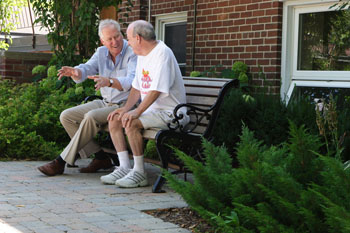|
|
Headlines (Campus Updates)
WLU
The university of the bedside
Spiritual care provider Nick Ruiter finds wisdom in his clients'
words
Public Affairs
|
|
 |
| |
Hospice clients are those living with a progressive, life-threatening
illness. Nick Ruiter (left) spends some time outside in a client's
garden.
|
Sep 18/06
Laurier grad Nick Ruiter has been a spiritual care coordinator
for ten years now, and some find it hard to believe that he can enjoy
his job as much as he does. Ruiter works with the terminally ill and,
along with a team of nurses, palliative physicians, volunteers and social
workers, provides compassionate, end-of-life care.
Working out of the Dorothy Ley Hospice on the ground of the Trillium
Health Centre in Toronto, Ruiter's job as a coordinator is to
address the emotional and spiritual needs of his clients and, offer
counseling and coordinate spiritual care services through the client's own
faith community or serve as primary spiritual care provider.
'Most Canadians understand that all are spiritual but not all are
necessarily religious,' says Ruiter. For him, spirituality and
dying have to do with the uniqueness of the person, their meanings, their
illness and their journey, 'whatever its contours.'
'In our society, many find it uncomfortable to talk about grief, dying and
death, but palliative care is about life, not death,' he says. 'It's
about living: in comfort with dignity, meaning and hope. In my
position I feel privileged to be allowed entry in peoples' lives during
what for them is often a vulnerable, intimate or even difficult time.'
Ruiter graduated from Waterloo Lutheran University in 1969 with a
BA in religious studies and a minor in psychology. He describes his
years at Laurier as a 'life-affirming adventure.'
'Where else,' he says, 'could you have after-class talks
comparing the ideas of Kierkegaard, Abraham's sacrifice of Isaac with
contemporary ideas about infanticide, and then shoot hoops in the gym with
the same professor?'
After his time at Laurier, Ruiter completed his MA in theology at
the University of Windsor. Then Ruiter found himself in the
construction business, where he worked for 20 years as a contractor in
Toronto's residential renovation and custom-home building market.
'My company was named Camus construction, after the French existentialist
I first read at WLU,' says Ruiter. 'While I was still working construction
I heard June Callwood interviewed on the CBC about Casey House - it must
have been around 1988 - and I tucked the idea of hospice away
because parenting required my time and my wife worked as a court room
lawyer.'
When Ruiter's boys Zach and Jacob - now 24 and 22 respectively –
had grown up, Ruiter took up a trained volunteer position at a Toronto
Hospice in 1994.
After a few years of training as a volunteer Ruiter became a spiritual
care coordinator, one of the few paid professional staff positions in
spiritual care for hospice work in Canada. In addition to his formal
theological studies, counseling courses and life experience, Ruiter's
ability to listen deeply is what he would place at the top of his
qualifications to serve the dying.
'Being aware of my own vulnerability or helplessness in my helping has
probably made me a better caregiver,' says Ruiter. 'I don't fix
anything. Clients are the experts of their own experience, but in being
with them and in the everydayness of caregiving lies something more:
sacredness. It's the clients who really get me out of bed in the
morning.'
Ruiter says he's following the visionary footsteps of the late
Dr. Dorothy Ley, a true Canadian champion of compassionate end-of-life
care. Ley regarded dying as essentially a personal journey, not a
medical event, placing emphasis on spirituality as the heart of hospice
care, even if it follows the needle of pain ad symptom management.
The hospice Ruiter works with serves approximately 75 clients
each month by visiting them in their home and offering their
palliative services. He describes each day like he's at the university
of the bedside, and the hospice clients are his teachers.
'Once a man told me: 'Time's no good for you when you're sick,' and he
managed a smile,' says Ruiter. 'Such living wisdom is not
easy to come by. I feel privileged; complete strangers one moment,
then not.'
After a decade of experience, Ruiter continues to learn lessons
from his clients and his days are filled with both laughter and tears.
'Usually the happiest moments are also the hardest,' he says. 'You
meet people who leave footprints on your heart. Exercising self-care is
key. The work is exhausting but so rewarding; I would not trade it for
anything in the world.'
Mallory O'Brien
Public Affairs
|




 vorige
vorige